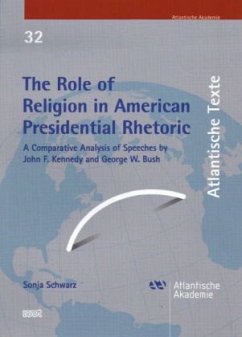What do George W. Bush and John F. Kennedy have in common? Quite a lot - according to the results of this comparative study on the religious rhetoric of American presidents. While it may come as a surprise for many Europeans to discover that George W. Bush - who in the context of the Iraq War was often demonized as a religious fanatic by the media - indeed used similar religious elements in his speeches as John F. Kennedy, who is still today idolized as a saint by many, did more than 40 years earlier. Shedding light on the existence of an American civil religion within American presidential rhetoric, this study reveals the importance of American traditions such as the fusion of politics and religion into a rather vague concept of national religiosity (civil religion) for a deeper understanding of what American presidents really talk about whenever God is mentioned. The study explains for example how the much-cited religiously inspired presidential phrases of the "New Frontier" (John F. Kennedy) or of the "Axis of Evil" (George W. Bush) came into being and what effect they had on US and international audiences. Through a close analysis of presidential speeches by Kennedy and Bush, it demonstrates how American presidents used the Bible to legitimize their policy actions and how their words influenced American public discourse. Finally the study maintains that religion will continue to be of significance in the future, irrespective of the personal faiths of the American presidents to come.

